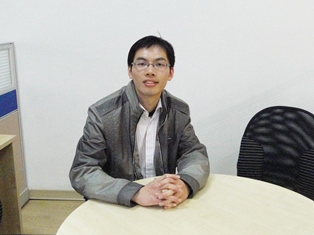
Qian Hao is an inaugural graduate of the SBC School of Engineering class of 2011. After four years of study in SBC, Qin Hao moved to the University of Bath for postgraduate study on Engineering Design. At present, Hao is preparing to commence his doctoral studies at the University of Portsmouth, with a full scholarship. This summer, the SBC News Centre had the opportunity to conduct an interview for Qin Hao to share his story with us, in the hope that many students could benefit or be inspired by his experiences. |
|
Q: As one of our inaugural graduates, you came study at SBC in year that the college was founded. It must have been a challenging decision for you to study at a newly founded college?
A: It was my decision to come to study at SBC. It has what I wanted for a higher educational institution. All the courses in SBC are taught by English. And students can receive the opportunity to study in Britain.
Q: Another challenging or I can say courageous decision you made was to choose Engineering as your major in SBC. I noticed lots of students mentioned the pressure to learn Engineering in Chinese. And you’re learning Engineering in English. Quite possibly there were extra pressures and difficulties for you compared to those who learnt this degree in Chinese. How do you feel about this? Was it tough?
A: Actually, it was kind of a challenge for me. Learning Engineering in English does present difficulties, but looking back at the experience until now, all the hard work was worth it. Besides, I have always been interested in Engineering. Learn what you love regardless of the difficulties and pressures.
Q: After four years of study at the SBC, you graduated with a First. Then you received an offer to read a Master’s degree at the University of Bath, one of top universities in Britain. Now you’re about to begin your doctoral study in the University of Portsmouth with a full scholarship. Reviewing your study experience, was it smooth or were there any interruptions and gaps. You seem to be a well-organized person with a clear mind and know what you want. Could you talk about this a little bit? |
|
A: To be honest, I wasn’t sure whether I should go abroad for further education or not during my first two years at the SBC. My future became clearer to me after I spent a year of study in Britain during the third year of my college life. On the one hand, the wonderful academic atmosphere in Britain proved that my idea to go further study abroad was right. On the other hand, one year learning and living experience in Britain made the decision practical and doable.
Once the decision was made, I worked much harder than before trying to hit my target. Entrance requirements at top British universities require upper second class degree for applicants at least. Getting a first-class degree helped a lot for my application. Thanks to my early preparation, the whole application proceeded well including choosing target universities, writing personal recommendation letters, asking teachers for recommendation and so on. In the end, I received an offer from the University of Bath, my favorite among the universities I applied for.
As far as continuing my study for a doctoral degree, the major reason is that the one year master study, in my opinion, was not enough in my area. I need more time to do study and research. Considering the high cost of doctoral study, it was obviously a good choice for me to go to the University of Portsmouth with a full scholarship.
Q: It is the new semester now. A lot of new students are arriving at the SBC and beginning a new chapter of their lives. As one of our successful graduates with great academic achievements so far, do you have any suggestions for those students?
A: To me, the most significant rewards of study at the SBC are independent learning or self-study, one of distinguished features of British education, and also a fact that is emphasised in the teaching model at SBC. From my understanding of British education, teachers only teach you basic knowledge and give you a picture of the whole structure or outline of knowledge to you during class. Then you need to spend plenty of time to go deeper, find all the puzzles and finish the whole picture by yourself. What you learn from the teachers is just the tip of the iceberg. The remainder lies underneath the water, and this is what you need to learn and explore.
My personal practice of independent learning or self-study is to study in good time without procrastinating. If I encounter questions on what I learn one day, I will try to figure it out within that day or by the end of that week by any means possible.







